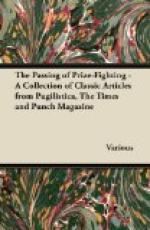“The feeling is perfectly reciprocal, believe me, my dear sir,” returned Julius, equally delighted with the imagined friendship of Mr. P.
“I trust that our acquaintance will not end here.”
“I shall be most proud to cultivate it, I can assure you.”
“Will you allow me to present you with a card?”
“I shall be too happy to exchange it for one of my own!” and so saying, the parties searched for their cases—Mr. P., in the mean time, protesting his gratification “to meet with a gentleman whose opinions so thoroughly coincided with his own,”—and Mr. C. as emphatically declaring “that he should ever consider this the most fortunate occurrence of his life.”
“Believe me, I shall be most happy to see you at any time,” observed Mr. Augustus Peacock, smiling as he placed the small oblong of cardboard which bore his name and address in the hand of his companion.
“I shall feel too proud if you will honour me with a call at your earliest convenience,” said Mr. Julius Candy bowing, while he presented to his fancied friend the little pasteboard parallelogram inscribed with his title and residence.
The eyes of the two gentlemen, however, were no sooner directed to the cards, which had been placed in their hands, than the smiles which had previously gladdened their countenances were instantaneously changed into expressions of the most indignant scorn and surprise.
“Peacock!” shouted Candy.
“Candy!” vociferated Peacock.
“Sir!” exclaimed the furious Mr. P., “had I known that Candy was the name of the man, sir, whom I was addressing, sir, my conduct you would have found, sir, of a very different character!”
“And had I been aware,” retorted the exasperated Mr. C., “that Peacock was the title of the fellow” (and he laid a forty-horse power of emphasis upon the word) “with whom I have been conversing, my card would never have been delivered to him but with a different motive.”
“Fellow, sir! I think you said—Fellow, sir!”
“I did, sir,—fellow was the word I used, and I repeat it—fellow—fellow!”
“You do, sir! and I throw back in your teeth, sir, with the addition of fool, sir!”
“Fool!—no, no—not quite a fool—only near one, sir!”
“You’re a conceited puppy, sir!”
“And you are an impudent scoundrel, sir!”
This brought matters to a crisis. The parties embraced their canes with more than ordinary ardour, and, by their lowering looks, indicated a fervent desire to violate the peace of her blessed Majesty, when the fair cause of their contention suddenly entered the apartment.
It was no difficult matter, in the positions they occupied, for Georgiana to divine the reason of their animosity; which she effectually allayed by informing the angry disputants, “that either had no reason to look upon the other with any degree of jealousy, for she humbly begged to assure them that her affections were devoted to—neither.”




